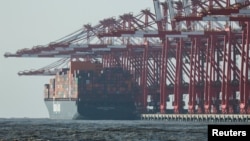China is a global power, the second largest economy in the world, with a rapidly growing military, noted Secretary of State Marco Rubio in a recent interview with Catherine Herridge. “We have to have relations with the Chinese,” he said. “Whether we agree with everything they do – we understand that in some cases we’re competitors, in others we’re direct adversaries. But there has to be communication because the lack of communication could lead to conflict.”
“That said, we are not going to live in a world where we depend on China – for critical rare earth minerals, for critical components in our supply chain,” stated Secretary Rubio. “We’re not going to live in a world in which China gets to dominate the Indo-Pacific ... and we’re not allowed to have commercial ties in that region because they’re holding countries hostage ... and they all become tributary states.”
“The Japanese have no interest in being a tributary state,” asserted Secretary Rubio, “and they’re close allies of ours.” South Korea, the Philippines, Australia, and Vietnam, “for that matter – are not interested in becoming ... tributary states in a Chinese zone of influence.”
“We are a Pacific nation,” declared Secretary Rubio. “We intend to remain one and maintain our relationships there. So that is a red line for us.”
The U.S. will also deal with unfairness in trade practices, stressed Secretary Rubio. “We allowed them to do anything they wanted in America. But American companies can virtually do nothing inside of China, and if they do it’s because they want to steal your intellectual property and then put you out of business and replace you with a Chinese company.”
There must be reciprocity, as President Donald Trump has stressed repeatedly. “Whatever we are allowed to do there is what they should be allowed to do here. Whatever they charge us on tariffs is what we should be charging them,” said Secretary Rubio.
With regard to Taiwan, Secretary Rubio said, “we don’t want to see a conflict. But we have made very clear through years and years of our policies – the Six Assurances, the Taiwan Relations Act – that we are against any sort of change in status by force or by threat or by coercion, and that remains our policy.”
U.S. policy towards China and the rest of the world must first and foremost further the U.S. national interest.






